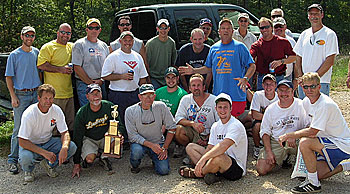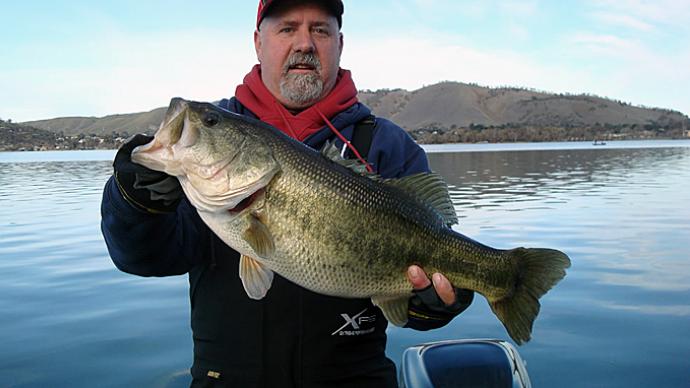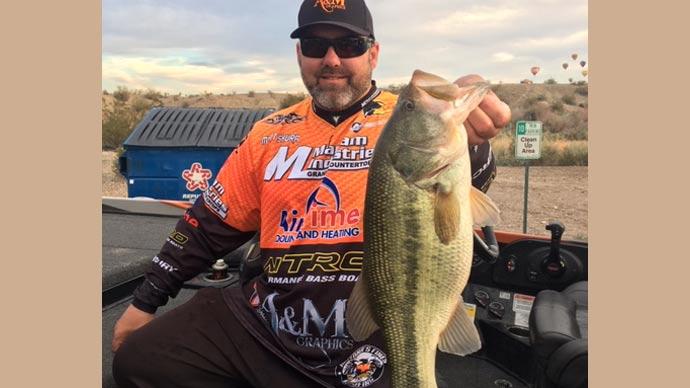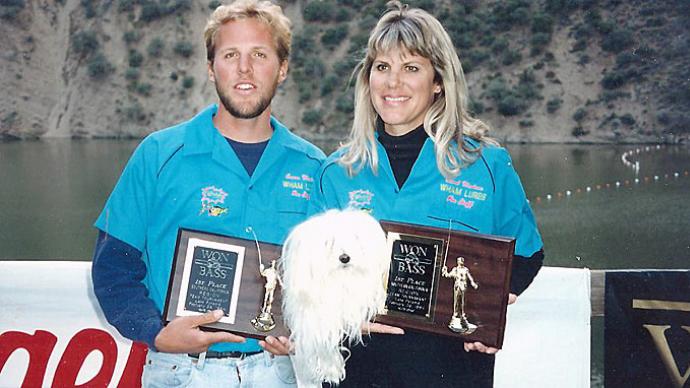
I have only come close to being killed once while fishing with my longtime friends, Jeff and Matt, at the Men’s Annual Fishing Tournament. We were getting up on plane with Jeff’s eighteen-foot fish and ski boat, humming along at more than 40 miles an hour. All three of us were standing in the front of the boat as we have a thousand times before, Jeff driving one hand on the wheel, one hand on the throttle. I was in front of the passenger seat, and Matt was standing right behind us. We were shouting over the roar of the motor discussing which way to find the honey hole, home to that lunker bass that might win the tournament, when everything suddenly slowed down. Yes, slowed down. In accordance with Newton’s third law of motion, I watched as the nose of the boat dove slowly underwater, foot by foot, in leisurely motion while feeling the back of the boat lift. We were flipping end over end. Every action has an equal and opposite reaction.
Water wasn’t splashing over the front, soaking the trolling motor and pedestal seat. I’ve seen that before. This was unlike anything I’d experienced; the boat was literally diving for the bottom, sounding like a submarine during a crash dive. As the bow dove, I could feel myself crushed by Matt’s hands flung forward against my back, the rear of the boat rising over our head, the engine screaming.
Forty years ago, I received South Torrance High School Varsity Most Improved Gymnast award. Cool. Who would have known it may have just saved my life as I grabbed the top edge of the windshield? Matt, weighing 200-plus pounds, nearly crashed me through the glass. Looking over my shoulder, I watched as the boat pivoted on its nose like a Chinese acrobat on a balance beam – 2,200 pounds hanging precariously in midair. Shouting over the high-pitched wail of the motor, I screamed for Jeff to shut the engine down as it redlined, the prop spinning in the air.
After what seemed like an eternity, the boat fell back with a whoosh, splash, and then quiet. We sat waist-deep in water that filled the boat to its top rail 200 yards from shore. We hit a 15-foot-long, 4-inch thick wood beam. It was submerged. Its black form is suspended inches underwater, allowing it to impact the outboard’s lower unit hitting squarely, instantaneously acting like a wing flipping the boat. Once we caught our breath, we smiled, partly because we were ok, partly because we just saw our lives pass before our eyes, and partly because this is why we get together for the Men’s Annual Fishing Tournament.
Every fall for the last 35 years, I’ve looked forward to fishing at our Men’s Annual Fishing Tournament. Two full days of fishing with friends on the Lake of the Ozarks, relaxing, catching up, and sharing each other’s passion for fishing.
The weekend consists of 25 guys, 11 boats, and a ton of food and drink. It is one of the highlights of the entire year. For the last decade, we have been staying at one of a handful of rustic Ozark resorts, the ones with beds in the living room, antiquated refrigerators, and a musty smell that reminds you of a cross between a cedar chest and a garage sale. Most of the resorts we stay at suggest you bring your own towel, not because they don’t have any, it is just that even the resort managers know that you should bring your own towels.
There was a time when The Annual was different. Not better or worse, just different. As men in our twenties, we would cram four or five guys in a couple of trucks, and with Jon boats and canoes fastened to the roofs, we made a point of visiting a different body of water every year. After a long fishing day, we drank all night, told dirty jokes, and played poker. The next morning we would crawl from our sleeping bags and try fishing again. Of course, we were younger back then.
The Men’s Annual Fishing Tournament has always been more than the tournament itself. There was the pre-tournament meeting, the bantering e-mails back and forth, and the anticipation. In January, bundled against the cold, I’d see a flurry of snow whisk by and think, “Maybe this year I’ll try a white spinnerbait on Three Mile Point,” or in March, as I underhand a piece of trash into the bin, I imagined flipping a jig beneath a low hanging branch.
I enjoy the Annual because I love fishing, but also, in a small way, I have squandered a lot of my fishing time. I didn’t start fishing until I was 23 years old. I didn’t get my first fishing rod or buy my first lure until I was an adult. It’s not that I envy people who fished when they were kids; I just miss not having the memories.
The first time I went fishing was with Stan, my brother-in-law. Stan was the center on the Southwest Missouri State’s football team. Seeing his gnarled, broken fingers nimbly demonstrate how to flip open the bail, hold the line and then flick a crawdad lure into the water was amazing. It was like he knew everything; learning to tie a decent fishing knot from Stan made me feel like a middle school ball player learning to field from Ty Cobb.
On one of our first trips, I remember fishing a small Missouri stream casting from a raised sandy bank surrounded by oaks and elms, the smell of wet rocks on the wind. Stan would lower the rod tip and side arm his lure placing it gently into the backside of a spinning eddy; it was glorious. It was on that first trip that Stan shared his signature cast, the Thump and Dip. The first time I watched him demonstrate it, he fell into the water.
Stan would explain that the purpose of the Thump and Dip was primarily to get your lure into an otherwise out-of-the-way area. You throttle your bait aiming at a nearby structure, ricocheting it off the target, allowing it to “dip” silently into the water. It is a lot like a bank shot in billiards. Any lure will work. A worm, crankbait, topwater, it doesn’t matter. Just rocket the beast across the water like a bullet and Thump the target. The target is critical, as it must be angled in the proper direction and have enough girth to allow the bait to careen off and drop stealthily into the water. A dock, for instance, the flat face of a bluff, or just a tree are all great targets. The bigger the target, the better.
The second aspect of the Thump and Dip involves the dip, where the lure, once deflected, gently comes to rest exactly where intended. The Thump and Dip can place the lure in a previously unreachable area and establish a unique presentation. One of the advantages of Stan’s Thump and Dip is the option of either a stealthy silence it can create as the bait drops noiselessly into the water or the impressive racket it can generate whacking a target.
By casting the Thump and Dip right, you can thump a rock and then allow your lure to roll into the water without the slightest ripple quietly. On the other hand, hammering the aluminum side of a boat dock at seven in the morning will often startle fish into a veritable frenzy, coincidently sending a shockwave of terror through your fellow angler. Unfortunately, the Thump and Dip is often mistaken by rookie anglers as a missed cast when it is truly a move toward what Stan calls “The next level of fishing.” More than anything else, Stan taught me never to take myself too seriously. Stan has been on every Annual since 1981.
Over the years, I learned from Bill, Dan, Joe, Tim, and anyone else who would join me on the water. Bob helped me purchase my first decent rod, Jeff to set the hook, and Matt showed me how to work underwater structure. The Olympic gold medal skier Jean-Claude Killy said, “The quickest way to be a champion is to imitate one.” That is just what I did. From the back of the boat, I watched as my buddies changed out their lures, asking causally why they’d chosen the Suspending Rogue rather than the Wiggle Wart, why the jig, why not the Senko? Silently I mimicked their slow retrievals of plastic worms or the patient way they walked a Zara Spook across the water. I watched as they battle a lunker bass, keeping the rod tip down, controlling the fish but never hogging the bass. With practice, patience, and passion, I got better until I finally, after years of diligence, won the annual not once or twice but three times, and that is where everything went off the tracks. Jealousy is a terrible wickedness.
It was ten years ago, during one of the pre-Annual meetings, that it was suggested that we construct a revolving trophy that would edify the angler who catches the biggest bass during the weekend – not the most bass, not the longest bass but the heaviest bass. With that honor, the champion‘s name and the weight of that bass would be added to the trophy for all time. It was just something to add a little competition to the Men’s Annual Tournament, a fun contest. Who knew that such a simple decision would change so much?
We started the trophy in 1990 and have added 16 names up to this point. Bob was the most accomplished angler, the favorite, having won five times previously, an assassin when it came to landing hog bass. He began fishing when he was four years of age, and with his keen knowledge of the lake and fierce determination, Bob was a force to be reckoned with. Jeff has won three times and was dogged and determined to catch Bob. The rest of the anglers were cousins, uncles, friends, and neighbors, all knowing that with every cast, there rested the potential to unveil the trophy bass that would win the tournament. I have won twice.
It was the second day of the tournament and, as is often the case, was the most difficult. We had all spent 10 hours on the water the day before, and muscles were sore, and expectations were humbled. I visited all my favorite spots and tried coaxing the fish with my most trusted lures but without any real success. Initially, in a tournament, you try to out-think the fish and outwit them.
Now, I was trying to outlast them. Besides luck, all we have as anglers is our intellect. Find a pattern and exploit that pattern until the 100 million years of evolution that has empowered the fish can be exploited. Unfortunately, high winds and a terrible cold front prevented me from discovering that pattern.
Noel, a solid and consistent fisherman, was in first place from the previous day with a relatively small bass weighing 2 pounds, 2 ounces. In years past, any bass in the 2-pound range would not be in the running, but with the unseasonably cold weather pushing in from the west and the winds churning the water to a field of punishing whitecaps, fishing was tough. Perched on the front of an 18-foot bass boat, the trolling motor rocketing in and out of the water with each windblown swell made fishing between docks and along bluff faces not just a challenge but treacherous. Most of the fishermen who typically crowded Lake of the Ozarks were staying home, but the Men’s Annual Fishing Tournament participants knew there was a trophy to be had. The only barrier between these anglers and immortality was a 3-pound bass.
With only two hours left, I knew I had to try something different that would force the fish to reconsider my lure. Finesse was out of the question, with high winds moving the boat and dragging any high profile low weight lures out of position. I needed something heavy enough to cast in the strong gusts but subtle and discrete enough to deceive the fish. Thump and dip. I could use Stan’s Thump and Dip technique and cast a jig supporting a creature bait like a twin tail grub. By throttling the jig against a low bluff face and then allowing it to rebound gently, sinking through the surface water turbulence, I could get the slow flutter presentation I needed despite the high winds. The Thump and Dip could win over the apprehensive fish below. Changing over to a larger jig with 5-inch twin tails, I smacked targets and let the lure fall gently into the water. Ten minutes later, I hooked a bass, not gigantic but a keeper.
Arriving back at the dock for weigh-in, only two anglers, me and Jeff Friz, had fish to size up against Noel. My fish was first weighed and watched as they hooked the thrashing fish to the electronic scale. I was skeptical that my barley legal bass would outweigh Noel’s 2-pound, 2-ounce featherweight. Holding the scale carefully, waiting for the fish to calm, Jim, our self-appointed official fish weigher, grinned as he shouted, “Two pounds, two ounces, a tie.”
Noel and I laughed. How were we going to handle that? Nevertheless, there was one more fish to weigh. If Jeff had the winner, any tie between my fish and Noel’s was irrelevant. The scale was cleared, and Jeff’s fish was weighed. The scale bounced between 2 pounds one to 2 pounds two until it ultimately rested on 2 pounds 2 ounces. It was a three-way tie!
Releasing the fish back into the lake, we had to discuss the results. Here's the dispute. Here lies the problem. Twenty-five guys, ages 21 to 70, arguing the merits of a three-way tie. Did anyone win the tournament? Did all three get third, or did all three win first, or perhaps as some say, nobody can say they won the Annual? What is the call?
At times like this, you have to look toward the legacy, the standard. Arguably the most respected platform for the competition is the Olympics. With a history that goes back thousands of years, the Olympics embody what is proper in sports. A representation of the honor surrounding the Olympics is the famed Olympic flame which symbolizes "purity, the endeavor for perfection, and the struggle for victory, peace, and friendship.”
With this in mind, we need to look back to the 2014 Olympic Games, where Tina Maze of Slovenia and Dominique Gisin of Switzerland raced down the Olympic ski course in exactly 1 minute, 41.57 seconds, sharing first place, with Lara Gut coming in third. There was no second place; two gold medals were awarded, both ladies first place winners sharing the top of the podium, an empty second tier, and third place getting the bronze. No silver medal was earned. Only three medalists and 22 unfortunate participants.
And so we have three first-place winners, no seconds, and no thirds—what a wonderful year. Considering everything from submerged timber to three-way ties, the Men’s Annual Fishing tournament is a fantastic event. Is it about winning or losing? Was the introduction of the trophy in 1990 a mistake? Only if we take ourselves too seriously, which Stan would say you should never do.



